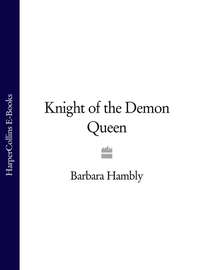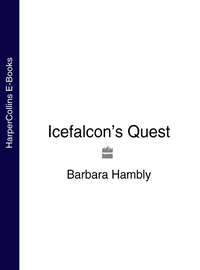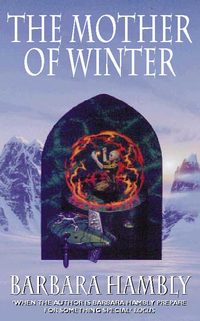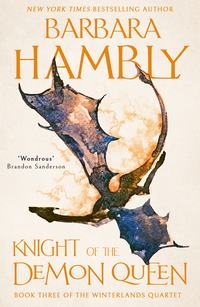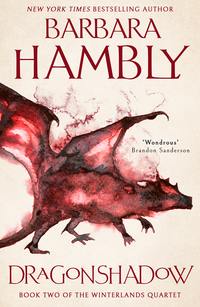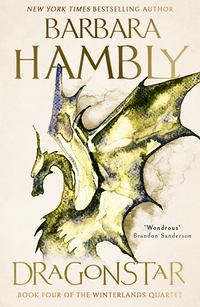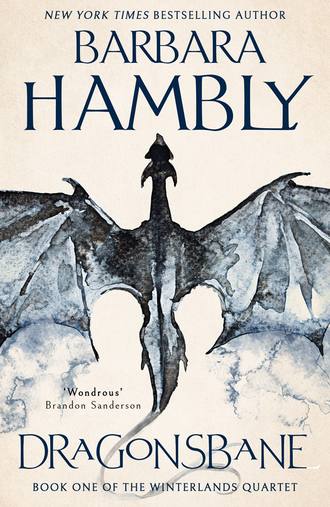
Полная версия
Dragonsbane
They started to tell her, in an excited and not very coherent duet, about a fox they had trapped, when a sound in the doorway made them turn. Gareth stood there, looking pale and tired, but dressed in his own clothes again, bandages making an ungainly lump under the sleeve of his spare shirt. He’d dug an unbroken pair of spectacles from his baggage as well; behind the thick lenses, his eyes were filled with sour distaste and bitter disillusion as he looked at her and her sons. It was as if the fact that John and she had become lovers—that she had borne John’s sons—had not only cheapened his erstwhile hero in his eyes, but had made her responsible for all those other disappointments that he had encountered in the Winterlands as well.
The boys sensed at once his disapprobation. Adric’s pugnacious little jaw began to come forward in a miniature version of John’s. But Ian, more sensitive, only signaled to his brother with his eyes, and the two took their silent leave. John watched them go; then his gaze returned, speculative, to Gareth. But all he said was, “So you lived, then?”
Rather shakily, Gareth replied, “Yes. Thank you—” He turned to Jenny, with a forced politeness that no amount of animosity could uproot from his courtier’s soul. “Thank you for helping me.” He took a step into the room and stopped again, staring blankly about him as he saw the place for the first time. Not something from a ballad, Jenny thought, amused in spite of herself. But then, no ballad could ever prepare anyone for John.
“Bit crowded,” John confessed. “My dad used to keep the books that had been left at the Hold in the storeroom with the corn, and the rats had accounted for most of ’em before I’d learned to read. I thought they’d be safer here.”
“Er …” Gareth said, at a loss. “I—I suppose …”
“He was a stiff-necked old villain, my dad,” John went on conversationally, coming to stand beside the hearth and extend his hands to the fire. “If it hadn’t been for old Caerdinn, who was about the Hold on and off when I was a lad, I’d never have got past the alphabet. Dad hadn’t much use for written things—I found half an act of Luciard’s Firegiver pasted over the cracks in the walls of the cupboard my granddad used to store winter clothes in. I could have gone out and thrown rocks at his grave, I was that furious, because of course there’s none of the play to be found now. God knows what they did with the rest of it—kindled the kitchen stoves, I expect. What we’ve managed to save isn’t much—Volumes Three and Four of Dotys’ Histories; most of Polyborus’ Analects and his Jurisprudence; the Elucidus Lapidarus; Clivy’s On Farming—in its entirety, for all that’s worth, though it’s pretty useless. I don’t think Clivy was much of a farmer, or even bothered to talk to farmers. He says that you can tell the coming of storms by taking measurements of the clouds and their shadows, but the grannies round the villages say you can tell just watching the bees. And when he talks about the mating habits of pigs …”
“I warn you, Gareth,” Jenny said with a smile, “that John is a walking encyclopedia of old wives’ tales, granny-rhymes, snippets of every classical writer he can lay hands upon, and trivia gleaned from the far corners of the hollow earth—encourage him at your peril. He also can’t cook.”
“I can, though,” John shot back at her with a grin.
Gareth, still gazing around him in mystification at the cluttered room, said nothing, but his narrow face was a study of mental gymnastics as he strove to adjust the ballads’ conventionalized catalog of perfections with the reality of a bespectacled amateur engineer who collected lore about pigs.
“So, then,” John went on in a friendly voice, “tell us of this dragon of yours, Gareth of Magloshaldon, and why the King sent a boy of your years to carry his message, when he’s got warriors and knights that could do the job as well.”
“Er …” Gareth looked completely taken aback for a moment—messengers in ballads never being asked for their credentials. “That is—but that’s just it. He hasn’t got warriors and knights, not that can be spared. And I came because I knew where to look for you, from the ballads.”
He fished from the pouch at his belt a gold signet ring, whose bezel flashed in a spurt of yellow hearthlight—Jenny glimpsed a crowned king upon it, seated beneath twelve stars. John looked in silence at it for a moment, then bent his head and drew the ring to his lips with archaic reverence.
Jenny watched his action in silence. The King was the King, she thought. It was nearly a hundred years since he withdrew his troops from the north, leaving that to the barbarians and the chaos of lands without law. Yet John still regarded himself as the subject of the King.
It was something she herself had never understood—either John’s loyalty to the King whose laws he still fought to uphold, or Caerdinn’s sense of bitter and personal betrayal by those same Kings. To Jenny, the King was the ruler of another land, another time—she herself was a citizen only of the Winterlands.
Bright and small, the gold oval of the ring flashed as Gareth laid it upon the table, like a witness to all that was said. “He gave that to me when he sent me to seek you,” he told them. “The King’s champions all rode out against the dragon, and none of them returned. No one in the Realm has ever slain a dragon—nor even seen one up close to know how to attack it, really. And there is nothing to tell us. I know, I’ve looked, because it was the one useful thing that I could do. I know I’m not a knight, or a champion …” His voice stammered a little on the admission, breaking the armor of his formality. “I know I’m no good at sports. But I’ve studied all the ballads and all their variants, and no ballad really tells that much about the actual how-to of killing a dragon. We need a Dragonsbane,” he concluded helplessly. “We need someone who knows what he’s doing. We need your help.”
“And we need yours.” The light timbre of Aversin’s smoky voice suddenly hardened to flint. “We’ve needed your help for a hundred years, while this part of the Realm, from the River Wildspae north, was being laid waste by bandits and Iceriders and wolves and worse things, things we haven’t the knowledge anymore to deal with: marshdevils and Whisperers and the evils that haunt the night woods, evils that steal the blood and souls of the living. Has your King thought of that? It’s a bit late in the day for him to be asking favors of us.”
The boy stared at him, stunned. “But the dragon …”
“Pox blister your dragon! Your King has a hundred knights and my people have only me.” The light slid across the lenses of his specs in a flash of gold as he leaned his broad shoulders against the blackened stones of the chimney-breast, the spikes of the dragon’s tail-knob gleaming evilly beside his head. “Gnomes never have just one entrance to their Deeps. Couldn’t your King’s knights have gotten the surviving gnomes to guide them through a secondary entrance to take the thing from behind?”
“Uh …” Visibly nonplussed by the unheroic practicality of the suggestion, Gareth floundered. “I don’t think they could have. The rear entrance of the Deep is in the fortress of Halnath. The Master of Halnath—Polycarp, the King’s nephew—rose in revolt against the King not long before the dragon’s coming. The Citadel is under siege.”
Silent in the corner of the hearth to which she had retreated, Jenny heard the sudden shift in the boy’s voice, like the sound of a weakened foundation giving under strain. Looking up, she saw his too-prominent Adam’s apple bob as he swallowed.
There was some wound there, she guessed to herself, some memory still tender to the touch.
“That’s—that’s one reason so few of the King’s champions could be spared. It isn’t only the dragon, you see.” He leaned forward pleadingly. “The whole Realm is in danger from the rebels as well as the dragon. The Deep tunnels into the face of Nast Wall, the great mountain-ridge that divides the lowlands of Belmarie from the northeastern Marches. The Citadel of Halnath stands on a cliff on the other side of the mountain from the main gates of the Deep, with the town and the University below it. The gnomes of Ylferdun were our allies against the rebels, but now most of them have gone over to the Halnath side. The whole Realm is split. You must come! As long as the dragon is in Ylferdun we can’t keep the roads from the mountains properly guarded against the rebels, or send supplies to the besiegers of the Citadel. The King’s champions went out …” He swallowed again, his voice tightening with the memory. “The men who brought back the bodies said that most of them never even got a chance to draw their swords.”
“Gah!” Aversin looked away, anger and pity twisting his sensitive mouth. “Any fool who’d take a sword after a dragon in the first place …”
“But they didn’t know! All they had to go on were the songs!”
Aversin said nothing to this; but, judging by his compressed lips and the flare of his nostrils, his thoughts were not pleasant ones. Gazing into the fire, Jenny heard his silence, and something like the chill shadow of a wind-driven cloud passed across her heart.
Half against her will, she saw images form in the molten amber of the fire’s heart. She recognized the winter-colored sky above the gully, the charred and brittle spears of poisoned grass fine as needle-scratches against it, John standing poised on the gully’s rim, the barbed steel rod of a harpoon in one gloved hand, an ax gleaming in his belt. Something rippled in the gully, a living carpet of golden knives.
Clearer than the sharp, small ghosts of the past that she saw was the shiv-twist memory of fear as she saw him jump.
They had been lovers then for less than a year, still burningly conscious of one another’s bodies. When he had sought the dragon’s lair, more than anything else Jenny had been aware of the fragility of flesh and bone when it was pitted against steel and fire.
She shut her eyes; when she opened them again, the silken pictures were gone from the flame. She pressed her lips taut, forcing herself to listen without speaking, knowing it was and could be none of her affair. She could no more have told him not to go—not then, not now—than he could have told her to leave the stone house on Frost Fell and give up her seeking, to come to the Hold to cook his meals and raise his sons.
John was saying, “Tell me about this drake.”
“You mean you’ll come?” The forlorn eagerness in Gareth’s voice made Jenny want to get up and box his ears.
“I mean I want to hear about it.” The Dragonsbane came around the table and slouched into one of the room’s big carved chairs, sliding the other in Gareth’s direction with a shove of his booted foot. “How long ago did it strike?”
“It came by night, two weeks ago. I took ship three days later, from Claekith Harbor below the city of Bel. The ship is waiting for us at Eldsbouch.”
“I doubt that.” John scratched the side of his long nose with one scarred forefinger. “If your mariners were smart they’ll have turned and run for a safe port two days ago. The storms are coming. Eldsbouch will be no protection to them.”
“But they said they’d stay!” Gareth protested indignantly. “I paid them!”
“Gold will do them no good weighting their bones to the bottom of the cove,” John pointed out.
Gareth sank back into his chair, shocked and cut to the heart by this final betrayal. “They can’t have gone …”
There was a moment’s silence, while John looked down at his hands. Without lifting her eyes from the heart of the fire, Jenny said softly, “They are not there, Gareth. I see the sea, and it is black with storms; I see the old harbor at Eldsbouch, the gray river running through the broken houses there; I see the fisher-folk making fast their little boats to the ruins of the old piers and all the stones shining under the rain. There is no ship there, Gareth.”
“You’re wrong,” he said hopelessly. “You have to be wrong.” He turned back to John. “It’ll take us weeks to get back, traveling overland …”
“Us?” John said softly, and Gareth blushed and looked as frightened as if he had uttered mortal insult. After a moment John went on, “How big is this dragon of yours?”
Gareth swallowed again and drew his breath in a shaky sigh. “Huge,” he said dully. “How huge?”
Gareth hesitated. Like most people, he had no eye for relative size. “It must have been a hundred feet long. They say the shadow of its wings covered the whole of Deeping Vale.”
“Who says?” John inquired, shifting his weight side-ways in the chair and hooking a knee over the fornicating sea-lions that made up the left-hand arm. “I thought it came at night, and munched up anyone close enough to see it by day.”
“Well …” He floundered in a sea of third-hand rumor.
“Ever see it on the ground?”
Gareth blushed and shook his head.
“It’s gie hard to judge things in the air,” John said kindly, pushing up his specs again. “The drake I slew here looked about a hundred feet long in the air, when I first saw it descending on the village of Great Toby. Turned out to be twenty-seven feet from beak to tail.” Again his quick grin illuminated his usually expressionless face. “It comes of being a naturalist. The first thing we did, Jenny and I, when I was on my feet again after killing it, was to go out there with cleavers and see how the thing was put together, what there was left of it.”
“It could be bigger, though, couldn’t it?” Gareth asked. He sounded a little worried, as if, Jenny thought dryly, he considered a twenty-seven foot dragon somewhat paltry. “I mean, in the Greenhythe variant of the Lay of Selkythar Dragonsbane and the Worm of the Imperteng Wood, they say that the Worm was sixty feet long, with wings that would cover a battalion.”
“Anybody measure it?”
“Well, they must have. Except—now that I come to think of it, according to that variant, when Selkythar had wounded it unto death the dragon fell into the River Wildspae; and in a later Belmarie version it says it fell into the sea. So I don’t see how anyone could have.”
“So a sixty-foot dragon is just somebody’s measure of how great Selkythar was.” He leaned back in his chair, his hands absentmindedly tracing over the lunatic carvings—the mingled shapes of all the creatures of the Book of Beasts. The worn gilding still caught in the chinks flickered with a dull sheen in the stray glints of the fire. “Twenty-seven feet doesn’t sound like a lot, ’til it’s there spitting fire at you. You know their flesh will decompose almost as soon as they die? It’s as if their own fire consumes them, as it does everything else.”
“Spitting fire?” Gareth frowned. “All the songs say they breathe it.”
Aversin shook his head. “They sort of spit it—it’s liquid fire, and nearly anything it touches’ll catch. That’s the trick in fighting a dragon, you see—to stay close enough to its body that it won’t spit fire at you for fear of burning itself, and not get rolled on or cut to pieces with its scales whilst you’re about it. They can raise the scales along their sides like a blowfish bristling, and they’re edged like razors.”
“I never knew that,” Gareth breathed. Wonder and curiosity lessened, for a moment, the shell of his offended dignity and pride.
“Well, the pity of it is, probably the King’s champions didn’t either. God knows, I didn’t when I went after the dragon in the gorge. There was nothing about it in any book I could find—Dotys and Clivy and them. Only a few old granny-rhymes that mention dragons—or drakes or worms, they’re called—and they weren’t much help. Things like:
“Cock by its feet, horse by its hame,
Snake by its head, drake by its name.
“Or what Polyborus had in his Analects about certain villages believing that if you plant loveseed—those creeper-things with the purple trumpet-flowers on them—around your house, dragons won’t come near. Jen and I used bits of that kind of lore—Jen brewed a poison from the loveseed to put on my harpoons, because it was obvious on the face of it that no fiddling little sword was going to cut through those scales. And the poison did slow the thing down. But I don’t know near as much about them as I’d like.”
“No.” Jenny turned her eyes at last from the fire’s throbbing core and, resting her cheek upon her hand where it lay on her up-drawn knees, regarded the two men on either side of the book-cluttered table. She spoke softly, half to herself. “We know not where they come from, nor where they breed; why of all the beasts of the earth they have six limbs instead of four …”
“‘Maggots from meat,’” quoted John, “‘weevils from rye, dragons from stars in an empty sky.’ That’s in Terens’ Of Ghosts. Or Caerdinn’s ‘Save a dragon, slave a dragon.’ Or why they say you should never look into a dragon’s eyes—and I’ll tell you, Gar, I was gie careful not to do that. We don’t even know simple things, like why magic and illusion won’t work on them; why Jen couldn’t call the dragon’s image in that jewel of hers, or use a cloaking-spell against his notice—nothing.”
“Nothing,” Jenny said softly, “save how they died, slain by men as ignorant of them as we.”
John must have heard the strange sorrow that underlay her voice, for she felt his glance, worried and questioning. But she turned her eyes away, not knowing the answer to what he asked.
After a moment, John sighed and said to Gareth, “It’s all knowledge that’s been lost over the years, like Luciard’s Firegiver and how they managed to build a breakwater across the harbor mouth at Eldsbouch—knowledge that’s been lost and may never be recovered.”
He got to his feet and began to pace restlessly, the flat, whitish gray reflections from the window winking on spike and mail-scrap and the brass of dagger-hilt and buckle. “We’re living in a decaying world, Gar; things slipping away day by day. Even you, down south in Bel—you’re losing the Realm a piece at a time, with the Winterlands tearing off in one direction and the rebels pulling away the Marches in another. You’re losing what you had and don’t even know it, and all that while knowledge is leaking out the seams, like meal from a ripped bag, because there isn’t time or leisure to save it.”
“I would never have slain the dragon, Gar—slay it, when we know nothing about it? And it was beautiful in itself, maybe the most beautiful thing I’ve ever laid eyes on, every color of it perfect as sunset, like a barley field in certain lights you get on summer evenings.”
“But you must—you have to slay ours!” There was sudden agony in Gareth’s voice.
“Fighting it and slaying it are two different things.” John turned back from the window, his head tipped slightly to one side, regarding the boy’s anxious face. “And I haven’t yet said I’d undertake the one, let alone accomplish the other.”
“But you have to.” The boy’s voice was a forlorn whisper of despair. “You’re our only hope.”
“Am I?” the Dragonsbane asked gently. “I’m the only hope of all these villagers, through the coming winter, against wolves and bandits. It was because I was their only hope that I slew the most perfect creature I’d ever seen, slew it dirtily, filthily, chopping it to pieces with an ax—it was because I was their only hope that I fought it at all and near had my flesh shredded from my bones by it. I’m only a man, Gareth.”
“No!” the boy insisted desperately. “You’re the Dragonsbane—the only Dragonsbane!” He rose to his feet, some inner struggle plain upon his thin features, his breathing fast as if forcing himself to some exertion. “The King …” He swallowed hard. “The King told me to make whatever terms I could, to bring you south. If you come …” With an effort he made his voice steady. “If you come, we will send troops again to protect the northlands, to defend them against the Iceriders; we will send books, and scholars, to bring knowledge to the people again. I swear it.” He took up the King’s seal and held it out in his trembling palm, and the cold daylight flashed palely across its face. “In the King’s name I swear it.”
But Jenny, watching the boy’s white face as he spoke, saw that he did not meet John’s eyes.
As night came on the rain increased, the wind throwing it like sea-breakers against the walls of the Hold. John’s Aunt Jane brought up a cold supper of meat, cheese, and beer, which Gareth picked at with the air of one doing his duty. Jenny, sitting cross-legged in the corner of the hearth, unwrapped her harp and experimented with its tuning pegs while the men spoke of the roads that led south, and of the slaying of the Golden Dragon of Wyr.
“That’s another thing that wasn’t like the songs,” Gareth said, resting his bony elbows amid the careless scatter of John’s notes on the table. “In the songs the dragons are all gay-colored, gaudy. But this one is black, dead-black all over save for the silver lamps of its eyes.”
“Black,” repeated John quietly, and looked over at Jenny. “You had an old list, didn’t you, love?”
She nodded, her hands resting in the delicate maneuverings of the harp pegs. “Caerdinn had me memorize many old lists,” she explained to Gareth. “Some of them he told me the meaning of—this one he never did. Perhaps he didn’t know himself. It was names, and colors …” She closed her eyes and repeated the list, her voice falling into the old man’s singsong chant, the echo of dozens of voices, back through the length of years. “Teltrevir heliotrope; Centhwevir is blue knotted with gold; Astirith is primrose and black; Morkeleb alone, black as night … The list goes on—there were dozens of names, if names they are.” She shrugged and linked her fingers over the curve of the harp’s back. “But John tells me that the old dragon that was supposed to haunt the shores of the lake of Wevir in the east was said to have been blue as the waters, marked all over his back with patterns of gold so that he could lie beneath the surface of the lake in summer and steal sheep from the banks.”
“Yes!” Gareth almost bounced out of his chair with enthusiasm as he recognized the familiar tale. “And the Worm of Wevir was slain by Antara Warlady and her brother Darthis Dragonsbane in the last part of the reign of Yvain the Well-Beloved, who was …” He caught himself up again, suddenly embarrassed. “It’s a popular tale,” he concluded, red-faced.
Jenny hid her smile at the abrupt checking of his ebullience. “There were notes for the harp as well—not tunes, really. He whistled them to me, over and over, until I got them right.”
She put her harp to her shoulder, a small instrument that had also been Caerdinn’s, though he had not played it; the wood was darkened almost black with age. By daylight it appeared perfectly unadorned, but when firelight glanced across it, as it did now, the circles of the air and sea were sometimes visible, traced upon it in faded gold. Carefully, she picked out those strange, sweet knots of sound, sometimes two or three notes only, sometimes a string of them like a truncated air. They were individual in the turns of their timing, hauntingly half-familiar, like things remembered from childhood; and as she played she repeated the names: Teltrevir heliotrope, Centhwevir is blue knotted with gold … It was part of the lost knowledge, like that from John’s scatterbrained, jackdaw quest in the small portion of his time not taken up with the brutal demands of the Winterlands. Notes and words were meaningless now, like a line from a lost ballad, or a few torn pages from the tragedy of an exiled god, pasted to keep wind from a crack—the echoes of songs that would not be heard again.
From them her hands moved on, random as her passing thoughts. She sketched vagrant airs, or snatches of jigs and reels, slowed and touched with the shadow of an inevitable grief that waited in the hidden darkness of future time. Through them she moved to the ancient tunes that held the timeless pull of the ocean in their cadences; sorrows that drew the heart from the body, or joys that called the soul like the distant glitter of Stardust banners in the summer night. In time John took from its place in a hole by the hearth a tin penny whistle, such as children played in the streets, and joined its thin, bright music to hers, dancing around the shadowed beauty of the harp like a thousand-year-old child.


